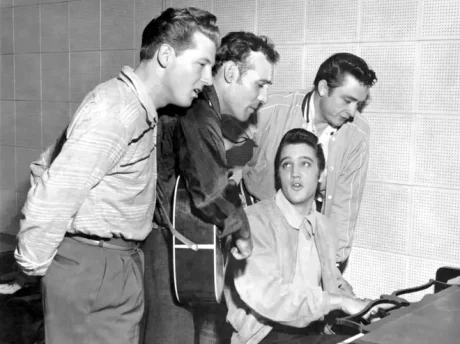
It was Bill Haley’s “Rock Around the Clock” in 1954 that broke the pre-internet “internet,” but can you explain the unusual ticking sound that you hear in the song? In 1955 it was Little Richard’s recording of “Tutti Frutti,” that caused such a fuss. So, what is relevant about Pat Boone’s version? Many folks know that the song “That’s All Right Mama,” recorded in 1956, put Elvis Presley on the map. Was Elvis the first artist to record the song or should we know about “That’s All Right” by Authur Crudup, recorded in 1946, ten years prior to Presley’s release?
And who was “The Million Dollar Quartet?” There was an impromptu jam session that took place simply by chance on December 4, 1956, involving Elvis Presley, Jerry Lee Lewis, Carl Perkins, and Jonny Cash. The picture earned its name from an article that was published in the Memphis Press-Scimitar under the title, “Million Dollar Quartet.” You probably did not know that. My point with all this is that music history matters, and it matters a lot. That tool of knowledge, in most cases, is the differentiation factor that influences customers to choose your store over a box. You may not have their advertising budget, but if you’re noticeably better with deep accurate music history knowledge, your chances of winning a customer’s loyalty improve markedly.
That photo of “The Million Dollar Quartet” hangs at the bottom of the staircase that leads to our teaching studios in Contemporary Music Center. I use it as a pop quiz when I escort new customers down the steps on a tour of our store. I ask them to name the musicians in the picture. Right now, you might want to crack open those music history books because later there will be a pop-quiz. By the way, everyone gets the names of Elvis and Jonny Cash right. This bizarre intervention is my way of letting potential customers know they have come to the right place to teach their kids. It’s our way of introducing what I call “The Differentiation Factor.” It gently shows first-timers that we know about music, and that we’re not just another pretty face.
Now more than ever, to sustain success, the small box stores need to play defense. To survive the economic down-turn caused by inflation, local music stores must have a unique vibe, borne fro a genuine depth of knowledge. That one simple quality allows all potential customers to know that they have picked the right place. To put it simply: it’s not about the size of the restaurant, it’s about the quality of the food and the uniqueness of the experience.
Here’s our reality… Distractions, or what I refer to as “the shiny factor,” which has everybody hopping to be bigger, faster, meaner, leaner, and everything to everybody. But in a time where inflation is killing the mood, and schools struggle to make up years of lost work, somebody must provide relief. Something must make us feel better, and somehow trust has to re-enter the discussion.
Here is the problem we need to confront. “The box” has entered the teaching space in a big way. New customers can become blinded by the shiny factor of the box stores, and they become confused because they are naïve to the new process. At first blush, it’s easy to confuse the value (or lack thereof) of the two experiences, so it becomes our job to show them that experiences are not the same. This is where we stress the differentiating factors. We go the extra mile to let them know us. We tell dog stories, we share stories about the success of former CMC students, we share students winning a golden ticket on “American Idol,” and stories about students that now live as musicians in Nashville, New York, or L.A. One approach we always strive to live by is not to bad-mouth the experience that the box offers. Instead, we share the success stories of our own students. We focus on our differentiation and keep the discussion positive.
So back to the quiz question: What is the ticking sound in “Rock Around the Clock?” The answer: It is Marshall Lytle’s slap bass part. Lytle was one of the pioneers of the rockabilly slap bass style. A style also mastered by the late Dave Roe, formally with Jonnie Cash – a bass style still honored in Nashville today by musicians the likes of Joe Fick.
So, what is your differentiation factor? Is it service? Is it specialized knowledge? Is it a specialized skill? Is it proprietary? If you are an independent music store something about your business is unique, so now you only have to get out your latter, climb up on the rooftop and shout it out loud!




























